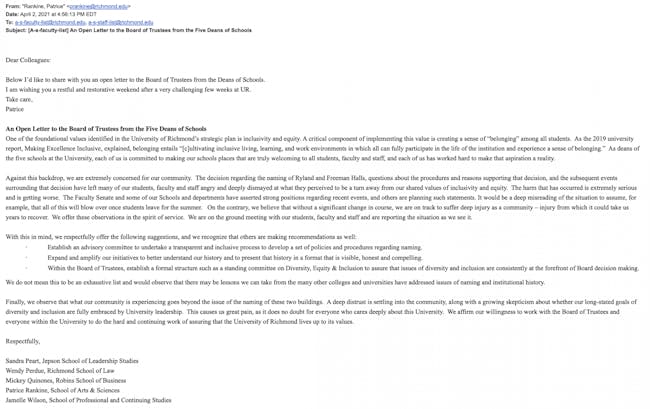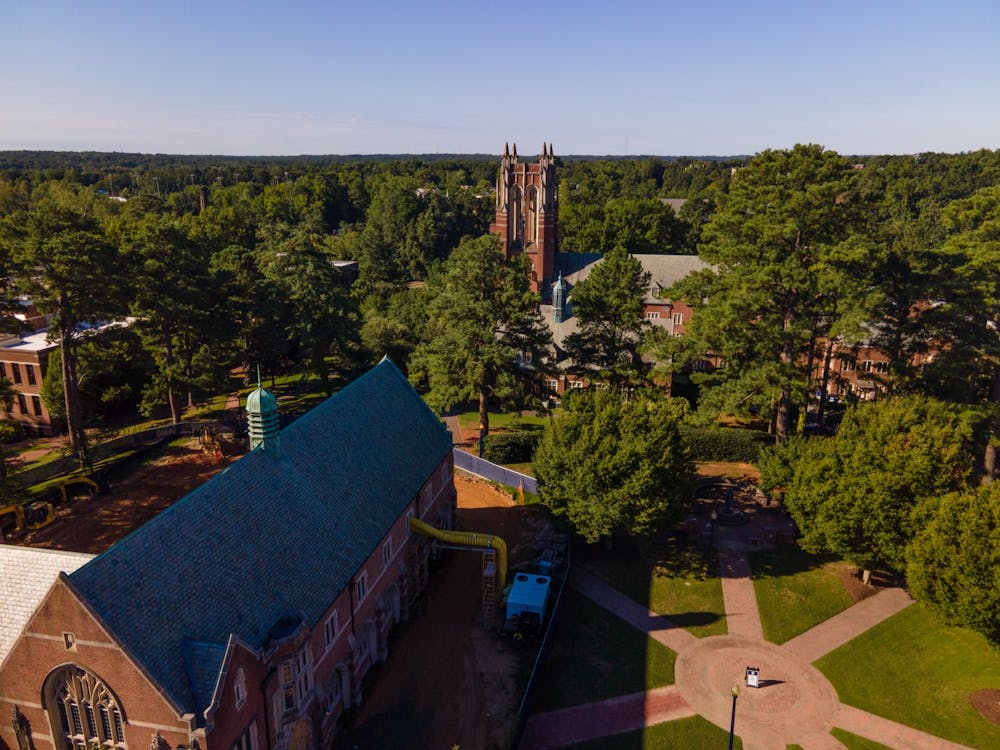Editor's Note: This article has been updated. Kristen Starks is a Collegian editor.
The deans of the five schools at the University of Richmond suggested the creation of a commission on renaming Ryland and Mitchell-Freeman halls to the Board of Trustees, according to an email sent to the Board.
The deans sent the email, which is titled “An Open Letter to the Board of Trustees from the Five Deans of Schools,” to the Board on April 2 and later shared it with UR faculty and staff via an email list.
The contributors include Sandra Peart, dean of Jepson School of Leadership Studies; Wendy Perdue, dean of Richmond School of Law; Mickey Quinones, dean of Robins School of Business; Patrice Rankine, dean of School of Arts and Sciences and Jamelle Wilson, dean of School of Professional and Continuing Studies.
The email listed several suggestions to the Board, the first of which was to “Establish an advisory committee to undertake a transparent and inclusive process to develop a set of policies and procedures regarding naming.”

An April 2 email sent to University of Richmond faculty by Patrice Rankine, outgoing dean of the Schools of Arts and Sciences.
The Board, which holds the authority to rename buildings, announced a commission on renaming in an email on April 12.
Some students expressed doubt that the commission signified progress.
Cameron Keeley-Parker, a senior, said there were positive developments, such as the inclusion of a student representative on the commission.
“However, due to the overwhelming presence of Board members, I still feel as though the same result is going to be made, as in no name change… I feel that it is another effort to stall,” she said.
Community members began protesting after the Board’s Feb. 25 decision to keep the name of Ryland Hall and change Freeman Hall to Mitchell-Freeman Hall, which are named after Robert Ryland, a slave owner, and Douglas Southall Freeman, a eugenicist and advocate of the "Lost Cause."
The decision by Ronald Crutcher, UR's outgoing president, and the Board to add the name of John Mitchell Jr., the editor of The Richmond Planet who was born into slavery and famous -- in part -- for challenging Freeman’s racism, “[was] part of telling the full and true story,” Crutcher wrote in an email to students and faculty.
Enjoy what you're reading?
Signup for our newsletter
“This juxtaposition provides a more accurate representation of Freeman and the realities of his time,” he wrote.
Many faculty, staff and students viewed these moves as denying the significance of Ryland and Freeman’s historical connections to racism. The UR Black Student Coalition decried the Board for “[creating] a dangerous false equivalency between Ryland and the people he enslaved as well as between Freeman and Mitchell.”
The BSC issued demands to rename each building: Ryland Hall would be renamed Walker Hall after Maggie Lena Walker, a Black banker, and Mitchell-Freeman would be renamed Mitchell Hall. Protect Our Web: A Statement on Black Student Welfare, identifies the Board’s refusal to change names as “evidence of just how deeply ingrained white supremacy still is at UR.”
Kristen Starks, a senior who participated in and helped organize multiple BSC protests this year, associated this renaming issue with UR’s foundation.
Starks said in an interview that, “The school was built entirely for white people… [and] the Board is a main factor of [structural racism].”
The Board twice reaffirmed its decision in March, but it was met with disapproval from community members. Alongside public protests on campus, hundreds of students disaffiliated from UR organizations in solidarity with the BSC’s Protect Our Web statement, and faculty passed a censure and vote of no confidence in the Board’s chairman and rector, Paul Queally.
The latter move garnered national attention through an article in the Washington Post, including a response to Queally’s conduct in a March 26 meeting. Seven attending faculty members wrote a statement that Queally called the issue of renaming a “closed matter,” “interrupted a Black woman staff member in the middle of her initial comments and noted that she sounded angry,” and marginalized non-white students by stating he hoped “to help Black, Brown, and regular students.”
On April 12, the Board released a notice that it had decided to suspend the previous naming decision and create the commission on renaming.
Some students expressed frustration or confusion at the decision.
“I honestly don’t entirely understand how they plan to do that," senior Claire King said. “[It’s] almost an admission that they were wrong before.”
Starks views this as the Board’s attempt to stall or outlast momentum from protests, she said.
“This commission is just [the Board] refusing to respond appropriately to the calls of students, faculty and staff,” she said. “[The BSC] think the commission is just a distraction process.”
Rankine said in an interview that the creation of the commission was a sincere effort.
“I think the notion that we set up a process whereby one could decide, through a kind of community buy-in, how we go about naming, renaming buildings… that’s some kind of balm to people who might be concerned that without such a commission, we could just rename all these buildings now," Rankine said. "So it's these two extremes.
"Either we will never rename, and that’s our policy… Or on the other side, anyone, any day can write an editorial and say, ‘let’s rename Boatwright Memorial Library…’ and then you don’t have any stability in your community."
He referenced the model of Yale, which created a “Committee to Establish Principles on Renaming” when changing the name of Calhoun College as an influential factor for the deans in proposing an advisory committee to the Board.
Alongside this suggestion to create a commission on renaming, the deans recommended the Board work to better present UR’s history and establish a standing committee on diversity, equity and inclusion, according to the email.
According to an April 23 message sent to the UR community by Crutcher and the Board, members of the Board unanimously voted to establish this committee.
"In electing to establish this committee, the Board reaffirmed its collective commitment to the University’s diversity, inclusion, and equity goals and to our shared aspirations to ensure that our academic community is a welcoming environment in which all members can thrive," Crutcher and the Board wrote.
Work for the DEI committee is expected to begin by this fall, according to the email.
Contact contributor Charlie Tabor at charlie.tabor@richmond.edu.
Support independent student media
You can make a tax-deductible donation by clicking the button below, which takes you to our secure PayPal account. The page is set up to receive contributions in whatever amount you designate. We look forward to using the money we raise to further our mission of providing honest and accurate information to students, faculty, staff, alumni and others in the general public.
Donate Now



